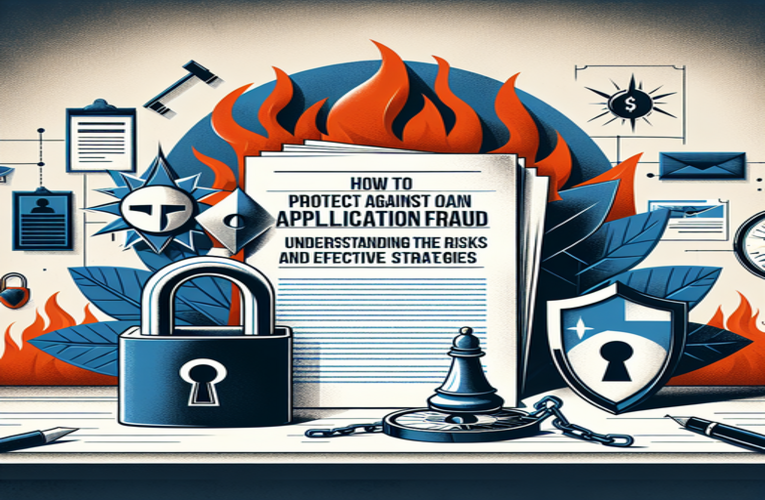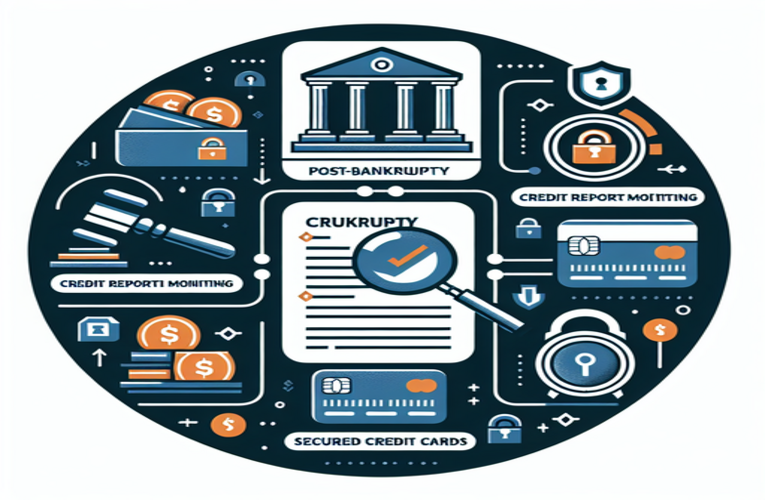How to protect consumer data in online loan applications: compliance security measures and monitoring strategies
In an era where digital transactions are becoming the norm, protecting consumer data in online loan applications is of utmost importance. With more borrowers turning to internet-based lending platforms, ensuring the security and privacy of personal and financial information has never been more critical. As financial technologies evolve, so do the tactics of cybercriminals, making it essential for businesses to adopt robust security measures to secure customer data in digital loan processes. In this article, we will delve into key strategies for safeguarding sensitive information in the online lending space.
Readers can expect to get insights into:
- Regulatory Compliance: Understanding the implications of regulations like GDPR and PCI DSS for data protection in online lending.
- Advanced Security Technologies: Exploring innovative methods such as encryption, two-factor authentication, and SSL certificates to enhance data security.
- Employee Training: Recognizing the role of staff education in combating cybersecurity threats and preventing data breaches.
By integrating practical measures and embracing compliance with established regulations, organizations can build a fortress around consumer data and foster trust among their clientele. With the staggering rise in data breaches—reportedly affecting around 30% of organizations last year—now is the time for businesses to strengthen their defenses, prioritize the safety of their consumers’ information, and understand how to protect personal data in online loan applications.
In today’s rapidly evolving landscape of digital lending, protecting consumer data in online loan applications is paramount. With the increasing reliance on digital platforms for financial services, understanding how to safeguard sensitive customer information is critical for both regulatory compliance and maintaining customer trust. Safeguarding personal and financial data is not merely a best practice—it is a fundamental necessity shaped by stringent data protection regulations worldwide. Organizations must fully commit to implementing robust security measures to effectively protect consumer data in the online loan application process.
Table of Contents
Regulatory Frameworks and Compliance
Compliance with data protection regulations such as the General Data Protection Regulation (GDPR) and the California Consumer Privacy Act (CCPA) is essential for any organization handling consumer data. These regulations mandate that organizations obtain explicit consent from consumers before collecting or processing their personal information. They also require transparency about data usage, enforce strict guidelines on data storage and sharing, and provide consumers with rights over their data, including access and deletion.
- General Data Protection Regulation (GDPR): Enforces strict data protection and privacy laws across European Union (EU) member states, affecting any company processing EU citizens’ data.
- California Consumer Privacy Act (CCPA): Grants California residents enhanced rights regarding the collection and use of their personal data.
- Payment Card Industry Data Security Standard (PCI DSS): Establishes stringent protocols for the management of credit card data, requiring organizations to maintain a secure environment.
- Penalties for Non-compliance: Non-compliance can result in substantial fines—up to 4% of annual global turnover under GDPR—and critically erode consumer confidence.
Adherence to these regulations forms the foundational step in protecting consumer data during online loan applications. Failure to comply not only leads to financial penalties but also damages an organization’s reputation and trustworthiness.
Implementing Comprehensive Data Protection Strategies
While regulatory compliance is crucial, it is insufficient on its own to fully safeguard consumer data in online lending. Implementing comprehensive data protection strategies that exceed minimum legal requirements is vital. Organizations should adopt robust security frameworks that encompass various aspects of data protection, including encryption, secure authentication methods, and regular security assessments. These proactive measures help businesses stay ahead of evolving cyber threats and demonstrate a commitment to consumer privacy and security.
Addressing Cybersecurity Challenges
The financial sector faces numerous cybersecurity challenges, including phishing schemes, malware attacks, unauthorized access, and data breaches. Research indicates that approximately 30% of financial organizations have experienced at least one cyber incident in the past year. To address these challenges, businesses must implement advanced security measures and remain vigilant against potential threats. Common challenges and solutions include:
| Challenge | Solution | Example |
|---|---|---|
| Phishing Schemes | Employee Training | Conducting workshops on identifying phishing emails and suspicious links |
| Unauthorized Access | Two-Factor Authentication | Implementing SMS codes or authentication apps like Google Authenticator |
| Data Breaches | Encryption Technology | Encrypting databases and using SSL/TLS for data transmission |
| Malware Attacks | Anti-Malware Software | Deploying enterprise-level security software to detect and prevent threats |
| Insider Threats | Access Control Measures | Implementing role-based access controls to limit data exposure |
| Outdated Software | Regular Updates | Maintaining up-to-date systems to protect against known vulnerabilities |
Advanced Authentication Methods
Secure authentication methods are crucial for protecting consumer data in online loan applications. Incorporating advanced authentication practices, such as two-factor authentication (2FA) and biometric verification, significantly enhances security.
- Two-Factor Authentication (2FA): Requires users to provide two forms of identification before accessing their accounts, typically a password and a one-time code sent to their mobile device. Research shows that 2FA can prevent up to 99.9% of automated attacks, highlighting its importance in data security.
- Biometric Authentication: Utilizes unique biological characteristics like fingerprints, facial recognition, or iris scans for verification. Biometric methods are difficult to replicate, offering robust protection against unauthorized access while providing a seamless user experience.
Implementing these methods not only strengthens security but also builds consumer trust. When users are aware that their personal information is protected by multiple layers of verification, their confidence in the platform increases.
Employee Training and Awareness
Human error is a leading cause of security breaches in the financial industry. To effectively tackle this challenge, businesses must prioritize comprehensive employee training programs focused on cybersecurity awareness. Regular training sessions should educate staff on identifying phishing schemes, recognizing malware threats, and adhering to security protocols. By empowering employees with the knowledge to recognize and respond to potential threats, organizations can significantly reduce the risk of security incidents resulting from human error.
Studies suggest that human error is a factor in over 90% of cybersecurity incidents, emphasizing the critical role employee awareness plays in data protection. Fostering a culture of security within the organization encourages employees to remain vigilant and proactive in safeguarding sensitive consumer data.
Leveraging Emerging Technologies
Incorporating emerging technologies such as artificial intelligence (AI) and machine learning (ML) introduces additional layers of protection. AI-driven systems can analyze vast amounts of transaction data to detect anomalies and patterns indicative of fraudulent activity in real time. For example, unexpected transactions from a new location or unusual spending behavior can trigger alerts for further investigation. These technologies enhance risk mitigation strategies by proactively identifying and blocking potential threats before they result in data breaches.
Additionally, integrating blockchain technology offers a decentralized and tamper-proof method of handling sensitive information. Blockchain can secure data transactions through cryptographic techniques, making unauthorized alterations virtually impossible. This technology provides transparency and security, further protecting consumer data in online loan applications.
Regular Monitoring and Audits
Ongoing vigilance through regular monitoring and security audits is vital for any platform engaged in online lending. Organizations should invest in comprehensive monitoring systems capable of detecting suspicious activities in real time. Routine audits of security infrastructure and practices help identify potential weaknesses and guide corrective measures to reinforce security.
Key Strategies for Effective Monitoring:
- Real-Time Surveillance: Implement systems that monitor network activity continuously to identify and respond to threats immediately.
- Security Audits: Conduct regular assessments of security protocols to ensure they meet current industry standards and adapt to new threats.
- Compliance Checks: Regularly review compliance with data protection regulations to avoid penalties and maintain consumer trust.
By proactively assessing and updating their security measures, businesses can stay ahead of cyber threats and ensure continuous protection of consumer data.
Prioritizing these strategies not only enhances the security of online loan applications but also strengthens consumer trust. By demonstrating a commitment to protecting consumer data through advanced security measures, regulatory compliance, employee training, and the adoption of emerging technologies, financial institutions can create a secure digital environment. This approach safeguards sensitive information and fosters enduring relationships with clients in the increasingly competitive digital lending industry.
Summary
To ensure the safety of consumer data in online loan applications, it is essential to focus on the following key areas:
- Regulatory Compliance: Adherence to regulations like GDPR, PCI DSS, and other data protection laws is critical, as they dictate the secure handling of consumer information in digital lending platforms.
- Advanced Security Technologies: Implement measures such as encryption, two-factor authentication (2FA), and secure socket layer (SSL) protocols to prevent unauthorized access and protect sensitive data during online loan processing.
- Employee Training: Regular training on cybersecurity threats, such as phishing, malware, and data breaches, enables staff to identify and mitigate risks effectively within online lending environments.
By embracing these strategies for data protection in online loan applications, organizations can foster consumer trust while enhancing data security in the increasingly complex digital lending landscape.
Additionally, ongoing monitoring, regular software updates, and the implementation of robust cybersecurity measures are crucial for maintaining security, along with comprehensive security audits to detect vulnerabilities proactively. Prioritizing these aspects not only protects consumer data but also solidifies a trustworthy relationship with clients in the realm of online lending.
Questions and Answers
What are some common cybersecurity threats faced by online loan applications?
Common cybersecurity threats targeting online loan applications include phishing attacks, malware infections, ransomware, unauthorized access, SQL injection, Distributed Denial of Service (DDoS) attacks, and data breaches. These threats can compromise sensitive consumer data, such as personal identification information and financial details, thereby eroding trust in digital lending platforms.
How does consumer trust impact the success of online lending platforms?
Consumer trust is crucial for the success of online lending platforms as it significantly influences users’ willingness to share personal information and engage with the service. A strong reputation for data protection and cybersecurity can lead to higher customer retention, increased user satisfaction, positive word-of-mouth, and ultimately, greater long-term profitability for online lenders.
What role does artificial intelligence play in enhancing consumer data protection?
Artificial intelligence plays a pivotal role in enhancing consumer data protection by monitoring transaction patterns, detecting anomalies in real time, and identifying potential cybersecurity threats proactively. AI-driven security systems can analyze vast amounts of data swiftly, enabling effective risk mitigation and ensuring the integrity and confidentiality of consumer information in online lending environments.
Can small lending organizations effectively implement data protection measures?
Yes, small lending organizations can effectively implement robust data protection measures by leveraging affordable cybersecurity technologies, conducting comprehensive employee training programs, and prioritizing data security within their business strategies. Additionally, adopting best practices such as encryption, regular security audits, and compliance with relevant data protection regulations can help small lenders safeguard consumer information effectively.
What are the financial implications of a data breach for a lending organization?
A data breach can result in substantial financial losses for a lending organization, including costs associated with legal penalties, regulatory fines, compensation claims, and the expenses of mitigating the breach. Furthermore, a breach can lead to a significant decline in consumer trust, resulting in lost business, decreased customer retention, and long-term damage to the organization’s reputation and profitability.
How can consumers protect their personal information when applying for loans online?
Consumers can protect their personal information when applying for loans online by using strong and unique passwords, enabling two-factor authentication for added security, and carefully reviewing the privacy policies of lending platforms before sharing personal data. Additionally, accessing loan applications through secure, encrypted connections and being vigilant against phishing attempts can further safeguard their sensitive information.
What legal actions can consumers take if their data is compromised?
If their data is compromised, consumers can file complaints with regulatory authorities such as data protection agencies, pursue lawsuits for damages against the negligent organization, or seek compensation based on breaches of data protection laws like the General Data Protection Regulation (GDPR). The available legal actions may vary depending on the jurisdiction and specific circumstances surrounding the data breach.
Why is employee training emphasized in the context of data protection?
Employee training is emphasized in the context of data protection because informed and vigilant staff members are essential in identifying and responding to cybersecurity threats. Proper training can significantly reduce the risk of data breaches caused by human error or negligence, ensuring that employees are aware of best practices, recognize potential security issues, and understand their roles in maintaining the organization’s data security posture.
What technologies can enhance user authentication in online lending?
Technologies that can enhance user authentication in online lending include biometric authentication methods such as facial recognition and fingerprint scanning, multi-factor authentication systems, secure password management tools, and token-based authentication mechanisms. Implementing these technologies can significantly improve user verification processes, reduce the risk of unauthorized access, and bolster overall data security within online lending platforms.
Are there specific regulatory requirements that online lenders must comply with?
Yes, online lenders must comply with a range of regulatory requirements to ensure consumer data protection and security. Key regulations include the General Data Protection Regulation (GDPR) for organizations operating within or dealing with the European Union, the Payment Card Industry Data Security Standard (PCI DSS) for handling payment information securely, and other local and international data protection laws and financial regulations that govern the collection, storage, and processing of consumer data.















